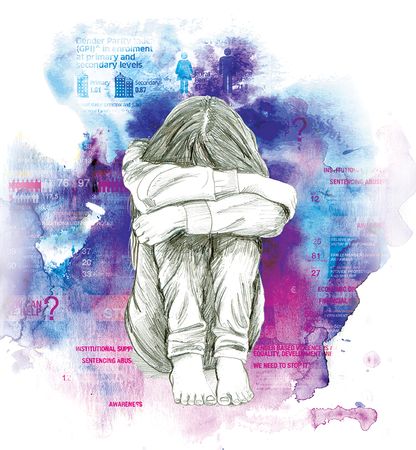Revenge is a dish best served cold, and this one came straight out of the freezer.
In a span of a few days, Shilpa went through a gamut of emotions. From absolute joy and utter disbelief to murderous rage and total despair, it was like riding a roller coaster she had no intention of being on.
The ride began in April, when the engineering graduate, 25, received an offer letter from one of the top IT companies in India. A coveted designation, a handsome salary and a cushy seat beckoned her. She was on top of the world. Sadly, in a couple of days, she would want to jump off.
The man who broke Shilpa was her college sweetheart. In fact, Vivek did to Shilpa what many jilted, tech-savvy lovers are doing—engaging in revenge porn. In Hyderabad, especially in the Cyberabad region, dozens of revenge porn cases have been reported in the past few months. 2017, in fact, has seen a sudden surge in these cases in India.
Revenge porn, as the name suggests, is a crime where people, usually jilted lovers, upload nude images or videos of their exes online. They do this either to make the victims bend to their will or to inflict psychological damage on the victims and their families.
Though this is a fairly new kind of crime, hate, in the personal space, has been around since man first felt emotion. Only the outlets have varied. The consequences of this hate can range from the trivial, such as not talking to a hated person, to the heinous, like murdering him.
A prime example can be found in Euripides’s Greek tragedy Medea. In the play, Medea’s husband, Jason, leaves her for a princess in order to further his station. Medea, furious, concocts a plan to avenge her betrayal. She poisons some golden robes and a coronet, and gifts them to Glauce, the other woman. Glauce accepts the gift with glee, puts it on and dies as the poison seeps into her skin. Medea, though satisfied, wants more. She wants to destroy the family Jason was about to leave. With a knife, she stabs to death her own two children, just to pour more grief on Jason. She then flees the country.

Another example, this one from real life, involves Russian dictator Josef Stalin. In his book The Anatomy of Human Destructiveness, German psychologist Erich Fromm writes about how Stalin would deal with those who had fallen out of his favour. Apparently, he liked to assure them that they were safe, only to have them arrested a few days later. In one striking case, one of Stalin’s party workers had a skating accident and suffered an almost fatal concussion. “On Stalin’s suggestion, outstanding surgeons were brought from abroad to save his life. After a long and difficult recovery, Akulov returned to work, whereupon he was arrested and shot.”
That hate is pervasive and enduring has been proved time and again. The question is—why does a person hate? Curiously, though it is a complex feeling, study on hate has been scarce. Most psychologists seem to agree that hate comes from a place of insecurity. Some say jealousy plays a part, while others say it comes from the feeling that the hated has wronged the hater in some way. According to American psychologist A.J. Marsden, people hate because they fear things that are different from them. An idea that, perhaps, has its roots in survival instinct. Then there is the notion that people hate in others what they fear within themselves. American psychologist Dana Harron suggests seeing the hated person as a movie screen, onto which the hater projects unwanted parts of himself. There are several other theories to explain hate, but none of them seems to be definitive.
Thankfully, most people just stew in their hate, without turning their thoughts into action. The few who do so helped create the term “hate crime”, which is defined as any regular crime, but with an added element of bias. These include crimes stemming from hate for a person’s race, religion, disability, sexual orientation or gender.
Though hate crimes are recognised as such in other countries, most notably the US, where there has been a recent spate of racially motivated attacks, India does not have a specific law to deal with such offences. There are sections of the Indian Penal Code that concern hate crimes, and an act to protect Scheduled Castes and Scheduled Tribes from violence, but there is no composite act, like America’s Hate Crimes Prevention Act (2009).
Interestingly, some of these hate crimes are born of a feeling opposite to hate—love. Take, for instance, revenge porn. Or acid throwing. The accused in such cases are mostly jilted or spurned lovers. In 2008, some scientists in London went looking for the love-hate link in the brain. They had 17 test subjects, most of whom picked an ex or a competitor at work as the person they hated (perhaps the most common “hated” people in every individual’s life). The volunteers were then hooked up to an MRI machine and, in each person, certain parts of the brain lit up at seeing a picture of their “hated one”. These areas of the brain came to be collectively known as the “hate circuit”. Interestingly, previous studies had shown that two parts of this circuit were activated when a person felt romantic love. So, it seems there could really be just a thin line between love and hate.

The coming of the internet gave this hate a new outlet. The web gave haters their greatest weapon—anonymity. Words that would earlier be swallowed for fear of retaliation were now appearing in bold letters on numerous fora. A recent article in a news website has put forth an interesting theory. It says that because people are now glued to the internet, there is less social interaction, which makes it easier to hate someone with an opposing argument. Essentially, with people represented as just “voices” on the internet, there is no scope for compassion or empathy. This dehumanises them and makes them easier to hate. This could perhaps be one of the reasons for the increase in hate crimes, globally, in recent years.
And, with the internet boom, in the case of people like Vivek, what was once private now became public. With a mail, he wrecked a life.
The story, according to police records, began in an engineering college on the outskirts of Hyderabad. Vivek and Shilpa were batchmates. In their second year, Vivek pursued Shilpa till she accepted his love. They dated through college and were going strong even after. But, while Shilpa excelled in academics, Vivek struggled to clear his backlog, appearing for the same exam semester after semester. This, however, did not affect their relationship. At first. The couple would meet often, mostly at coffee bars, and Vivek would bring up the topic of marriage. Shilpa, also looking to settle down, would gladly discuss her future with him.
Soon, however, the rosy romance withered under uncertainty and peer pressure. With engineering degrees in hand, the couple tried hard to gain a foothold in the IT industry. Shilpa soon joined a domestic IT company, but Vivek failed to land a job. This triggered a spate of fights, mostly about Vivek’s career. It was a lean patch for the couple.
Then came the day that changed Shilpa’s life. Sometime last year, Vivek asked Shilpa to meet him at his sister’s place. His sister had gone out and the couple was alone. Shilpa, after spending some time with Vivek, excused herself, and went to another room to change her outfit. Vivek, however, followed her and, without her knowledge, captured her nude photos.
In the next few months, Shilpa’s career took off and the cracks in the romance widened. In April, after she was offered a good role in a big IT company, in HITEC city, she told Vivek and her parents. While her folks were happy, her boyfriend grew more restless. Shilpa had been after him to get a job because she wanted to tell her parents about their relationship.
Soon, she called him up on a weekend, telling him that her parents would not agree to their marriage unless he got a job. With no options left, she told him that they should part ways. A new side to Vivek emerged. He told Shilpa about the photos, threatening her into staying with him. In fact, he was so consumed by hate that he stopped preparing for his entrance exams and focused solely on blackmailing her. According to his family members, Vivek became irritable and hardly spoke to them. He even stopped talking to his friends or going out.
After a few days, he mailed the nude photos to Shilpa’s email addresses (she had three) and threatened to make them public. To inflict more pain, he did this frequently. Shilpa, who didn’t even know about the photos, skipped work for a few days and pleaded with Vivek to stop. A person related to the case, and close to Shilpa, said she was under a lot of stress. “Even I cannot believe that a person like him could be so spiteful,” said the person. “Like Shilpa, we knew Vivek as a warm and friendly person who could not harm anyone.”
Clearly, they were mistaken. Next, Vivek began extorting money from Shilpa. Over the following three months, she gave him more than 01 lakh for daily expenses. Then, when Shilpa refused to yield to him physically, he sent the nude images to her company e-mail address. He also texted her, saying that she deserved it. When Shilpa switched off her phone and went incommunicado, he sent the images to her mother on WhatsApp. Apparently, thinking that she had blocked his number on all of her family’s phones, he used his own mother’s phone to sent the photos.
Shilpa’s household plunged into darkness. Her uncle volunteered to talk to Vivek and called him up. “You cannot do anything to me,” he was told. “I have relatives who are police officers and they will support me. Your niece is at fault and I will punish her.” Shilpa’s family went to the police, who arrested Vivek, from his house, within a day. However, like other accused in similar cases, Vivek remained unapologetic. “Forget repenting, the accused in such cases do not even think that they did something wrong,” said Janaki Sharmila, deputy commissioner of police, crimes, Cyberabad. The IPS officer, who is well-versed in cyber crimes, has personally overseen the investigation of many revenge porn cases.
Interestingly, unlike hardened criminals, Vivek and his ilk usually have a healthy upbringing. Amarnath, Vivek’s uncle, said he was like any other youngster, fond of movies, food and cricket. He did not have a violent streak or any run-ins with the law during college. The family, in fact, is still in a state of disbelief and has gone into isolation after Vivek was arrested, he said. Amarnath, like many close to Vivek, say that his only mistake was that he was deeply in love with a girl, a la filmy romeos, so much so that he lost his sense of right and wrong.
“I observed that those who commit this crime are usually from middle class or well-to-do families. As they have had a comfortable and pampered upbringing, they act like brats,” said Sharmila. “They think they can get away with anything. It is also the parents’ responsibility to make sure that they inculcate the right values in their children. One needs to understand that if a girl has no interest in continuing the relationship, there will be no happiness even if the marriage takes place by force.” With a spike in such cases, the officer is planning to partner with NGOs to start counselling sessions for victims.
There is also concern that the law is not stringent enough in such cases. Vivek, for instance, was booked under sections of the Information Technology Act and for breach of trust. But, after spending a few days as an undertrial prisoner, he is out on bail. Revenge porn, say cyber experts, is treated as a white collar crime and the maximum punishment, if there is a conviction, would be about five years. The slow pace of trials has also emboldened the accused, they say.
In 2012, one of the first cases of revenge porn was registered in Hyderabad. The accused, who uploaded objectionable images and videos of his former partner to more than 200 websites, is now leading an almost free life. After a few days in judicial remand, he again started uploading objectionable images of the victim to websites, much to the dismay of the victim and the investigating officers.
“It is important for the victim to seek legal advice before filing a first information report,” said Jyoti Das, a senior lawyer who deals with cyber crime at Tatva Legal, a law firm in Hyderabad. “Sometimes, the accused might be booked under one or two sections, which makes it easier for him to get away with the crime. The law has to be seen holistically. If the victim is mindful, the accused can be booked under all relevant sections, so that he gets the maximum punishment.”
Revenge porn is also a headache for activists as, in most cases, the victims suffer in silence. “There is a social stigma attached with revenge porn cases,” said Sarah Mathews, managing trustee, Sankalp—Women’s Support Alliance, an NGO in Secunderabad. “The victims do not easily come out and deal with the issue because of social pressure. There has to be general awareness in public and the attitude towards such cases has to change.”
As for Shilpa, with fresh cases taking precedence, she is struggling to make sense of her identity at office and at home. She has dismounted the roller coaster, and is looking for a place to throw up.
Some names have been changed.
With Anirudh Madhavan







